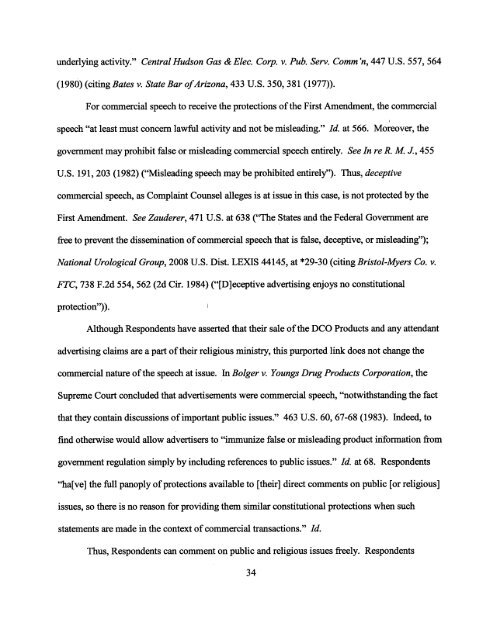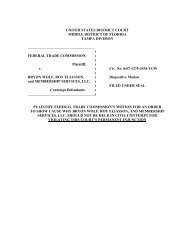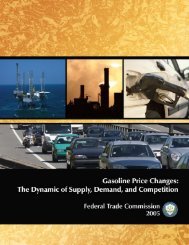Complaint Counsel's Post Trial Brief - Federal Trade Commission
Complaint Counsel's Post Trial Brief - Federal Trade Commission
Complaint Counsel's Post Trial Brief - Federal Trade Commission
Create successful ePaper yourself
Turn your PDF publications into a flip-book with our unique Google optimized e-Paper software.
underlying activity." Central Hudson Gas & Elec. Corp. v. Pub. Servo Comm 'n, 447 U.S. 557, 564<br />
(1980) (citing Bates V. State Bar of Arizona, 433 U.S. 350, 381 (1977)).<br />
For commercial speech to receive the protections of<br />
the First Amendment, the commercial<br />
,<br />
speech "at least must concern lawful activity and not be misleading." Id. at 566. Moreover, the<br />
goverent may prohibit false or misleading commercial speech entirely. See In re R. M. J., 455<br />
U.S. 191,203 (1982) ("Misleading speech may be prohibited entirely"). Thus, deceptive<br />
commercial speech, as <strong>Complaint</strong> Counsel alleges is at issue in ths case, is not protected by the<br />
First Amendment. See Zauderer, 471 U.S. at 638 ("The States and the <strong>Federal</strong> Goverent are<br />
free to prevent the dissemation of commercial speech that is false, deceptive, or misleading");<br />
National Urological Group, 2008 U.S. Dist. LEXIS 44145, at *29-30 (citing<br />
Bristol-Myers Co. v.<br />
FTC, 738 F.2d 554,562 (2d Cir. 1984) ("(D)eceptive adversing enjoys no constitutional<br />
protection")).<br />
Although Respondents have assered that their sale ofthe DCO Products and any attendant<br />
adverising clais are a par of their religious mistr, this purorted lin does not change the<br />
commercial natue of the speech at issue. In Bolger v. Youngs Drug Products Corporation, the<br />
Supreme Cour concluded that advertisements were commercial speech, "notwithstanding the fact<br />
that they contain discussions of<br />
important public issues." 463 U.S. 60, 67-68 (1983). Indeed, to<br />
fid otherwise would allow adverisers to "immunze false or misleading product iriformation from<br />
goverent regulation simply by including references to public issues." Id. at 68. Respondents<br />
"ha(ve) the full panoply of<br />
protections available to (their) direct comments on public (or religious)<br />
issues, so there is no reason for providing them simlar constitutional protections when such<br />
statements are made in the context of commercial transactions." Id.<br />
Thus, Respondents can comment on public and religious issues freely. Respondents<br />
34

















